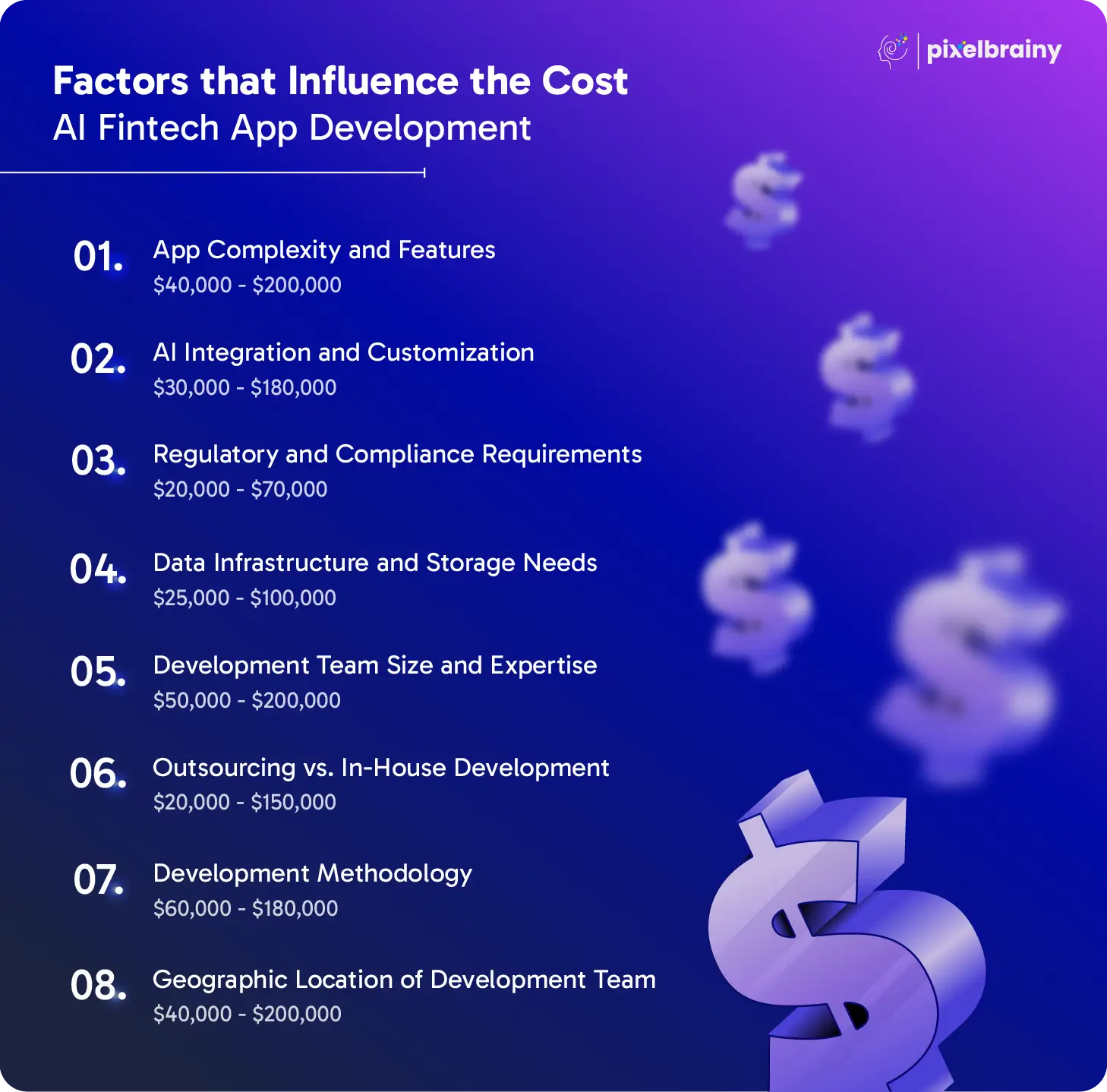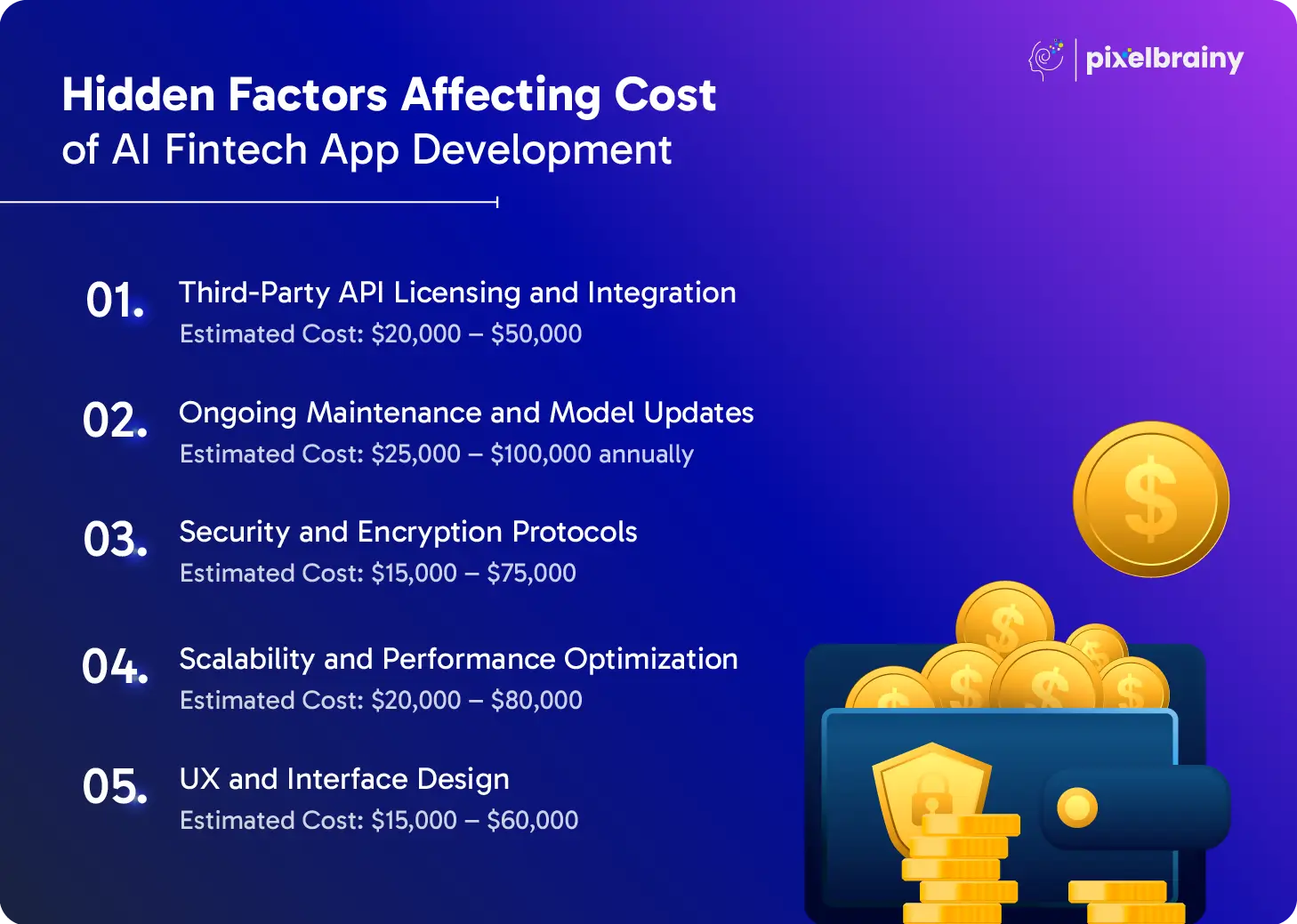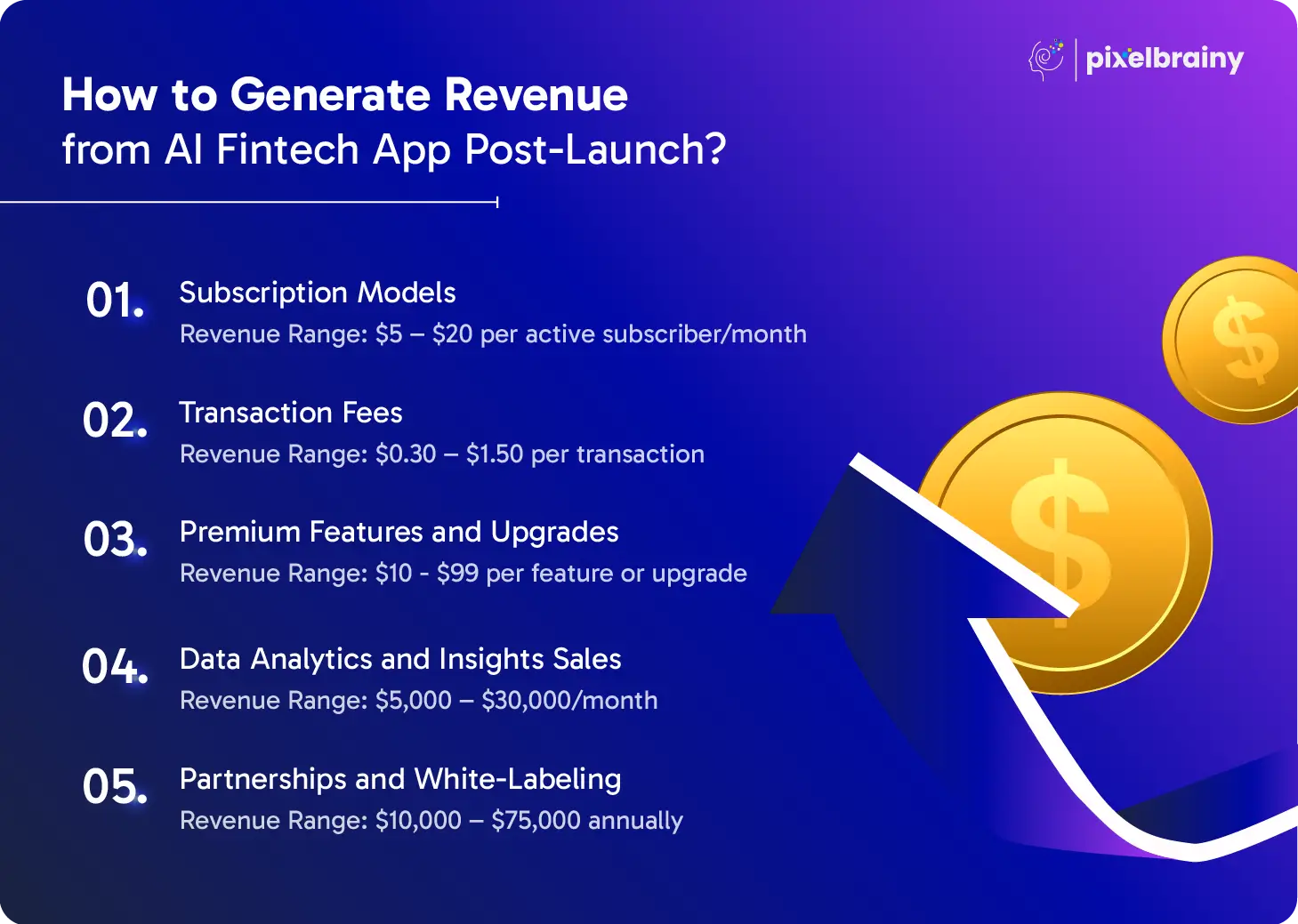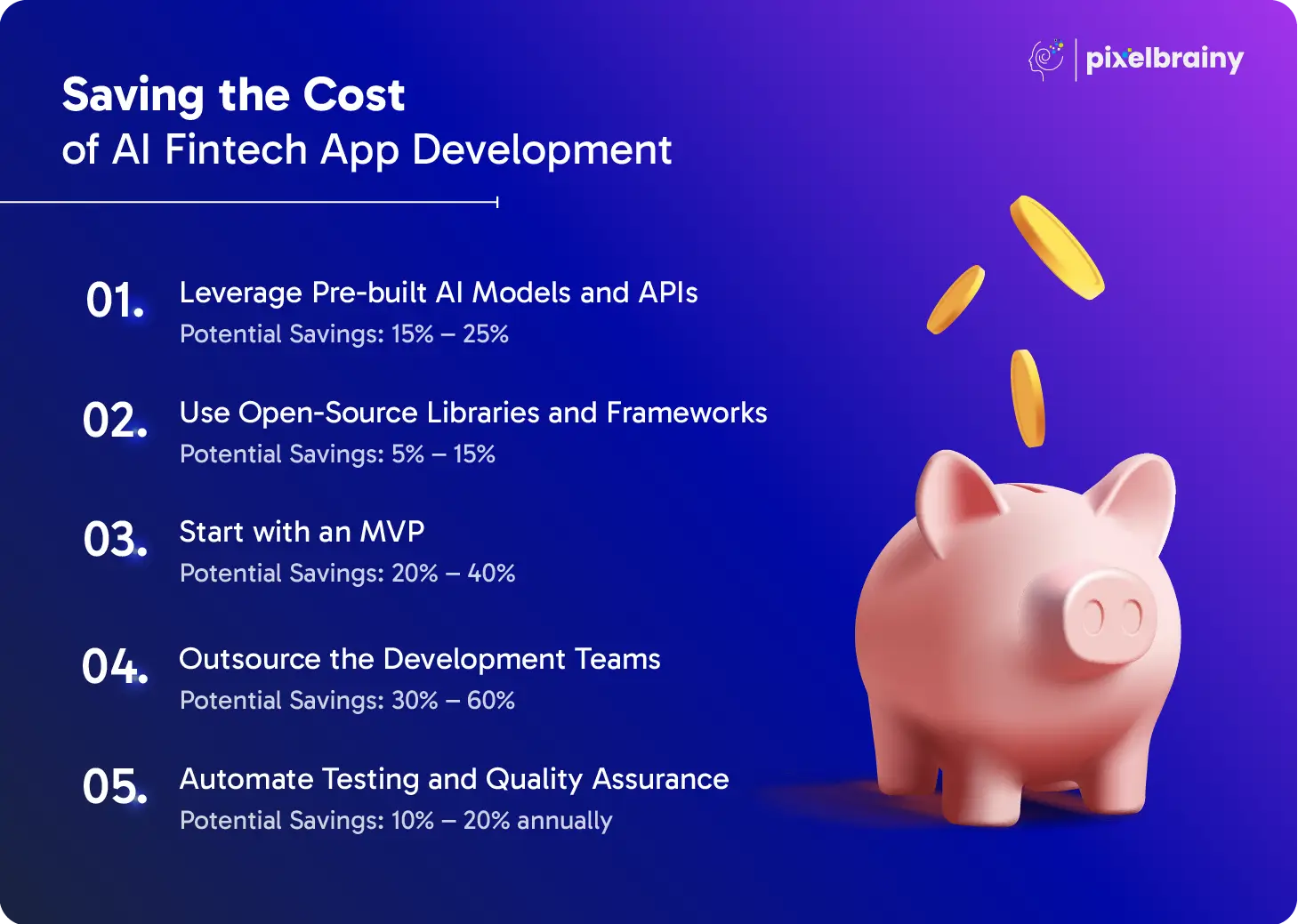In 2026, more fintech founders and product leaders are making a shift to AI to stay ahead of the pack, automate smarter, and boost customer satisfaction. But before creating the next AI-powered solution, there’s one critical question that needs answering:
What is the cost to build an AI fintech app?
The AI fintech app development cost isn’t fixed. It ranges between $20,000 – $200,000+, based on various factors like the complexity of features, compliance needs, and whether you are building from scratch or upgrading an existing platform integration AI. Whether it’s an AI chatbot for customer support or an intelligent risk-scoring engine, each feature comes with its price tag.
This guide streamlines everything you need to know about the AI fintech app development cost in 2026. We will break down key cost drivers, unveil usually overlooked hidden factors to consider, provide pro tips to optimize the development cost of AI fintech apps, and share examples to show how these costs apply to actual fintech apps.
Whether you are just exploring your idea or scheduling a launch-ready plan, this blog will help you confidently estimate the cost of developing AI fintech app and make smarter decisions along the way.
AI is transforming the fintech industry, enhancing fraud detection, automating credit scoring, and personalizing financial services. But while the benefits are evident, the cost of developing AI fintech app can add up quickly without careful planning.
Here’s why understanding the cost initially is crucial for any founder, product manager, or stakeholder:
In a nutshell, cost is not just a matter of development; it is a business decision. Comprehending what drives the cost to develop AI fintech app in 2026 helps you manage spending, prioritize features, and create a product that performs well in the real world.
| Illustrative Case For Better Understanding Real-World Scenario: Klarna's AI Integration Klarna, a leading fintech company, integrated generative AI into its operations, resulting in significant cost savings: -> $10 Million Annual Savings -> $6 Million Reduced Image Production Costs -> Customer Service Efficiency -> 37% Cost Savings (AI alone is responsible) This example illustrates how strategic AI implementation can lead to substantial cost reductions and operational efficiencies. Source: Reuters |
Mistake to Avoid:
AI models demand continuous retraining, especially in finance, where user behavior and regulations change. Budgeting only for initial development is a critical trap.
How to estimate the cost of AI fintech app development?
When planning the cost to develop AI fintech app, it is important to understand how diverse factors can impact the overall cost and development timeline. Some of these factors are directly related to the complexity and level of customization included in your app, while geographical considerations and regulatory needs impact the others.
Here’s the budget breakdown for AI fintech app development and the anticipated timeline. Let’s briefly discuss cost to build AI App for Fintech.

The more complex the features in your AI fintech app, the higher the development cost. AI fintech apps embracing advanced functionalities, such as personalized financial advice, real-time analytics, or fraud detection systems, need a larger team, more time, and technical tools.
Cost estimate: $40,000 - $200,000
| Feature Complexity | Estimated Cost | Estimated Timeline |
| Basic Fintech App | $40,000 - $80,000 | 3 - 6 months |
| Advanced Fintech App | $80,000 - $140,000 | 5 - 7 months |
| Enterprise-level Fintech App | $140,000 - $200,000 | 6 - 9 months |
Integrating AI into your fintech app, particularly if the AI needs to be highly customized, can greatly impact the cost. Customization involves setting up AI models, training data, and creating algorithms that contribute to AI fintech app development cost in 2026 and time.
Cost estimate: $30,000 - $180,000
| Level of Customization | Estimated Cost | Estimated Timeline |
| Basic AI Integration | $30,000 - $60,000 | 2 - 4 months |
| Medium Customization (e.g., NLP) | $60,000 - $120,000 | 3 - 5 months |
| Highly Custom AI Models | $120,000 - $180,000 | 4 - 6 months |
In the fintech industry, regulatory compliance is a fundamental factor. Ensuring the app fulfills financial regulations, such as KYC/AML, GDPR, and other privacy laws, can incur substantial costs due to security implementations, legal consultations, and additional testing.
Cost estimate: $20,000 - $70,000
| Compliance Requirement | Estimated Cost | Estimated Timeline |
| Basic Compliance (e.g., GDPR) | $20,000 - $30,000 | 1 - 2 months |
| Full Regulatory Compliance | $30,000 - $50,000 | 2 - 3 months |
| Extensive Legal and Security Audits | $50,000 - $70,000 | 3 months |
Managing huge financial data securely and efficiently demands robust data storage and infrastructure. Cloud storage, database management systems, and secure servers must be properly set up, raising the overall development cost.
Cost estimate: $25,000 - $100,000
| Infrastructure Type | Estimated Cost | Estimated Timeline |
| Cloud Storage and Basic Infrastructure | $25,000 - $50,000 | 2 - 3 months |
| Mid-Level Infrastructure | $50,000 - $80,000 | 3 - 4 months |
| High-End Infrastructure (for large-scale apps) | $80,000 - $100,000 | 4 months |
The size and expertise of your development team will affect both cost and timeline. A large team of AI developers with fintech knowledge will expedite development, but come with a more elevated price tag. A smaller, less experienced team may take longer, extending the timeline.
Cost estimate: $50,000 - $200,000
| Team Size & Expertise | Estimated Cost | Estimated Timeline |
| Small Team (basic AI, fintech knowledge) | $50,000 - $90,000 | 4 - 6 months |
| Medium-Sized Team (experienced professionals) | $90,000 - $150,000 | 6 - 9 months |
| Large Team (top-tier specialists) | $150,000 - $200,000 | 9 - 12 months |
Choosing between outsourcing and in-house development can make a major difference in AI fintech app development cost in 2026 and timeline. Outsourcing to regions with lower labor costs may decrease the overall cost, while in-house teams could result in higher rates but provide better control and possibly faster turnaround.
Cost estimate: $20,000 - $150,000
| Development Approach | Estimated Cost | Estimated Timeline |
| Outsourcing (Eastern Europe/Asia) | $20,000 - $100,000 | 3 - 6 months |
| In-house Development (North America/Europe) | $100,000 - $150,000 | 6 - 12 months |
The development methodology influences the cost and timeline of the project. Agile development is more flexible and iterative, which may lead to faster adjustments but can also result in more frequent changes, impacting the budget. Waterfall development is more linear and structured, but can periodically introduce inefficiencies in meeting client needs.
Cost estimate: $60,000 - $180,000
| Methodology Type | Estimated Cost | Estimated Timeline |
| Agile Development | $60,000 - $150,000 | 3 - 9 months |
| Waterfall Development | $100,000 - $180,000 | 6 - 12 months |
The geographic location of the development team plays a vital role in the cost structure. Teams based in North America or Europe typically charge higher rates than teams in regions like Eastern Europe or Asia, where labor costs are lower.
Cost estimate: $40,000 - $200,000
| Location | Estimated Cost | Estimated Timeline |
| North America/Europe | $100,000 - $200,000 | 4 - 12 months |
| Eastern Europe/Asia | $40,000 - $100,000 | 3 - 9 months |
| Factor | Estimated Cost | Estimated Timeline |
| App Complexity and Features | $40,000 - $200,000 | 3 - 9 months |
| AI Integration and Customization | $30,000 - $180,000 | 2 - 6 months |
| Regulatory and Compliance Requirements | $20,000 - $70,000 | 1 - 3 months |
| Data Infrastructure and Storage Needs | $25,000 - $100,000 | 2 - 4 months |
| Development Team Size and Expertise | $50,000 - $200,000 | 4 - 12 months |
| Outsourcing vs. In-House Development | Outsourcing: $20,000 - $100,000 In-house: $100,000 - $200,000 | Outsourcing: 3 - 6 months ; In-house: 6 - 12 months |
| Development Methodology | Agile: $60,000 - $150,000 Waterfall: $100,000 - $180,000 | Agile: 3 - 9 months ; Waterfall: 6 - 12 months |
| Geographic Location of Development Team | North America/Europe: $100,000 - $200,000 Eastern Europe/Asia: $40,000 - $100,000 | North America/Europe: 4 - 12 months; Eastern Europe/Asia: 3 - 9 months |
Note: The costs and timelines listed are estimates and can vary depending on your app’s feature complexity, specific requirements, team location, and development approach. Use this table as a starting point to plan your budget and prepare more effectively.

While core features and development models are of greatest concern, numerous hidden factors can quietly escalate the cost to build AI fintech app. These behind-the-scenes elements are critical for a secure, scalable, and future-ready platform. Ignoring them can end up with delays or budget overruns down the line.
Let’s unveil the most overlooked hidden factors:

Most AI fintech apps depend on APIs for services, such as payments, identity verification (KYC), or credit scoring. These integrations may arrive with licensing fees, usage limits, or per-call pricing.
Estimated Cost: $20,000 – $50,000
Includes: API access fees, integration development, and performance testing
AI systems demand regular retraining, fine-tuning, and performance updates to stay accurate and compliant. This post-launch cost is essential for maintaining a competitive advantage.
Estimated Cost: $25,000 – $100,000 annually
Includes: AI model updates, bug fixes, API versioning, and compliance updates
Data protection is a non-negotiable for any fintech app. Advanced encryption, anti-fraud mechanisms, and secure user authentication all contribute to AI fintech app cost.
Estimated Cost: $15,000 – $75,000
Includes: End-to-end encryption, multi-factor authentication, and secure cloud setup
As user volume extends, your app needs to scale efficiently. Creating a system that can manage high-load environments from day one can preserve major infrastructure costs later.
Estimated Cost: $20,000 – $80,000
Includes: Load testing, cloud scaling architecture (e.g., AWS, Azure), and caching strategies.
A seamless, intuitive interface enhances user retention and trust, which is especially crucial in financial apps. High-quality UX/UI often needs experienced designers and testing.
Estimated Cost: $15,000 – $60,000
Includes: UX research, wireframing, UI prototyping, and user testing
These hidden elements may not show up on early budgeting spreadsheets, but they play an integral role in shaping the long-term performance, security, and user trust of your AI fintech app.
| Hidden Cost Factor | Description | Estimated Cost |
| Third-Party API Licensing and Integration | Costs related to payment gateways, KYC, credit scoring APIs, etc. | $20,000 – $50,000 |
| Ongoing Maintenance and Model Updates | Continuous AI training, compliance, and version updates | $25,000 – $100,000 annually |
| Security and Encryption Protocols | End-to-end security measures to ensure data protection and regulatory adherence | $15,000 – $75,000 |
| Scalability and Performance Optimization | Building infrastructure for growth and traffic management | $20,000 – $80,000 |
| UX and Interface Design | Designing a smooth, intuitive user experience | $15,000 – $60,000 |
AI is recasting how fintech apps deliver value, from personalized finance to smarter investments.
Let’s look at some outstanding AI-powered fintech apps in the US and the fintech sector that are setting benchmarks, and what AI-powered financial app development pricing is to build something similar.
Cleo is a personal finance app that utilizes AI to offer budgeting assistance and financial advice, especially targeting younger users. Its conversational interface delivers a relatable and engaging user experience.
Top AI Features:
Estimated Cost to Build an App Like Cleo: $50,000 – $100,000
Why It Stands Out: Cleo fuses the power of AI with a conversational interface to make financial management more accessible and engaging, particularly for younger demographics looking for relatable financial tools.
Upstart is an AI-driven lending platform that evaluates creditworthiness using alternative data, such as education and employment history, to offer personal loans.
Top AI Features:
Estimated Cost to Develop an App Like Upstart: $80,000 – $150,000
Why It Stands Out: By integrating AI and alternative data, Upstart offers a more inclusive lending approach, extending access to credit for individuals with limited credit histories.
Ellevest is an investment platform specifically designed for women, presenting personalized investment portfolios and financial planning tools.
Top AI Features:
Estimated Cost to Create an App Like Ellevest: $150,000 – $200,000
Why It Stands Out: Ellevest handles gender-specific financial challenges through AI-driven personalization, authorizing women to take control of their financial futures.
SoFi offers a comprehensive suite of financial services, embracing lending, investing, and banking, with AI improving various aspects of the user experience.
Top AI Features:
Estimated Cost to Make an App Like SoFi: $150,000 – $200,000
Why It Stands Out: SoFi's AI integration across various financial services delivers users a seamless and personalized financial management experience.
Webull is a commission-free trading platform that uses AI to provide users with advanced trading tools and market analysis.
Top AI Features:
Estimated Cost to Build an App Like Webull: $150,000 – $200,000
Why It Stands Out: Webull reaps the benefits of AI that enhances the trading experience by providing sophisticated tools generally reserved for professional traders, democratizing access to advanced market insights.
Ramp is a corporate expense management platform that utilizes AI to assist businesses in optimizing spending. It provides corporate cards and real-time analytics to simplify financial operations.
Top AI Features:
Estimated Cost to Develop an App Like Ramp: $100,000 – $150,000
Why It Stands Out: Ramp's AI-driven approach to expense management allows businesses to identify cost-saving opportunities and boost financial efficiency.
Oportun is a mission-driven fintech company that makes use of AI to offer affordable credit and financial services to underserved communities.
Top AI Features:
Estimated Cost to Create an App Like Oportun: $80,000 – $150,000
Why It Stands Out: Oportun reaps the rewards of AI to promote financial inclusion by providing responsible credit options and financial tools to individuals with fixed access to traditional banking services.
Cash App is a mobile payment service that lets users transfer money, invest in stocks and Bitcoin, and handle personal finances through an AI-enhanced platform.
Top AI Features:
Estimated Cost to Make an App Like Cash App: $150,000 – $200,000
Why It Stands Out: Cash App integrates different financial services into a single platform, using AI to boost user experience and security.
| App Name | Top AI Features | Estimated Development Cost | Why It Stands Out |
| Cleo | AI chatbot for budgeting, spending insights, and personalized finance coaching | $50,000 – $100,000 | Friendly, conversational interface that resonates with Gen Z & Millennials. |
| Upstart | AI credit scoring, alternative data use, and automated underwriting | $80,000 – $150,000 | Uses non-traditional data to expand lending access and reduce defaults. |
| Ellevest | AI-based goal planning, gender-focused investment algorithms, personalized portfolio rebalancing | $150,000 – $200,000 | Built specifically for women, using AI to tailor investing strategies to their goals and realities. |
| Sofi | AI-driven credit risk models, personalized financial planning, and automated investment strategies | $150,000 – $200,000 | Combines loans, investing, and banking with AI to deliver a full-stack financial experience. |
| Webull | AI-powered trading insights, risk analysis, and forecasting, real-time market data filtering | $150,000 – $200,000 | A data-rich trading app leveraging AI to assist self-directed investors and traders. |
| Ramp | Expense optimization, smart alerts, and real-time analytics | $100,000 – $150,000 | Empowers businesses to cut costs and simplify financial workflows. |
| Oportun | AI loan modeling, automated savings, personalized offers | $80,000 – $150,000 | Financial inclusion for underserved communities through AI credit modeling. |
| Cash App | AI fraud detection, stock & Bitcoin suggestions, auto-categorization | $150,000 – $200,000 | Combines payments, investments, and budgeting in one user-friendly platform. |
Note: These development cost ranges are estimates for building AI fintech platforms in 2026 like these. Actual costs can vary depending on AI complexity, third-party integrations, compliance scope, and developer location
These real-world examples demonstrate that building a successful AI fintech app is less about following trends and more about delivering intelligent, personalized financial experiences strategically and cost-effectively.

Building an AI fintech app is only half the game; the real success lies in turning your innovation into a revenue engine. Choosing the right monetization model can help your app become more than a tool; it is a scalable business.
Below are proven strategies fintech leaders utilize to drive sustainable growth after launch.

Why it works: Predictable recurring revenue, user loyalty, and better lifetime value (LTV).
Revenue Range: $5 – $20 per active subscriber/month
Why it works: Scales with usage; more transactions, more revenue.
Revenue Range: Varies based on transaction volume; for example, $0.30 – $1.50 per transaction.
Why it works: Users are willing to pay for tools that save them time or improve outcomes.
Revenue Range: $10 - $99 per feature or upgrade
Why it works: High-margin B2B revenue from institutions seeking user intelligence.
Revenue Range: $5,000 – $30,000/month (B2B)
Why it works: Expands your tech's reach while keeping operational costs low.
Revenue Range: $10,000 – $75,000 annually, based on partnership terms
| Revenue Model | Description | Average Revenue Range | Monetization Strength |
| 1. Subscription Model | Users pay monthly/annually for access to core AI-driven features | $5 – $20 per active subscriber/month | High recurring revenue |
| 2. Transaction Fees | Charge per transaction or % of processed payments | $0.30 – $1.50 per transaction | Scales with user activity |
| 3. Premium Features & Upgrades | Advanced AI capabilities behind paywalls | $10 – $99 per feature upgrade | Boosts user LTV |
| 4. Data Analytics & Insight Sales | Sell anonymized insights or behavioral trends to financial institutions | $5,000 – $30,000/month (B2B) | High margin for B2B |
| 5. Partnerships & White-Labeling | License core AI tech to fintech or banks under their brand | $10,000 – $75,000 per deal | Strong for enterprise scaling |
Bonus Tip: Combine two to three monetization models for a hybrid strategy. For example, Cleo leverages a mix of subscriptions and premium features, while Upstart earns via transaction fees and B2B partnerships.
Smart budgeting doesn’t mean cutting corners; it means making strategic choices. By making use of the right tools, approaches, and global resources, you can build a high-performing AI fintech app without going over your budget. Here’s how to do it right:

Instead of creating complex algorithms from scratch, use reliable pre-trained models or third-party APIs, like for fraud detection or credit scoring. These solutions save time and reasonably bring enterprise-grade AI to your app.
Why it helps: Reduces both development time and AI engineering costs.
Example: Using Google Cloud’s AutoML for natural language processing instead of hiring a full ML team.
Potential Savings: 15% – 25%
Open-source tools, such as TensorFlow, PyTorch, and Scikit-learn, offer robust AI capabilities without licensing fees. They also arrive with active communities and frequent updates.
Why it helps: Eliminates software costs and accelerates prototyping.
Example: Developing an AI-powered recommendation engine using Python libraries instead of custom code.
Potential Savings: 5% – 15%
An MVP permits you to test your core concept with basic features first. It stops overbuilding and helps accumulate user feedback before scaling.
Why it helps: Prevents overspending on features users may not require.
Example: Launching a basic budgeting assistant before adding robo-advisory features.
Potential Savings: 20% – 40%
Hiring skilled developers from regions like Eastern Europe or India can significantly cut labor costs while still ensuring high-quality code.
Why it helps: Access top talent without paying top-tier domestic rates
Example: Outsourcing backend AI integration to a certified firm in Poland instead of hiring in-house in the US.
Potential Savings: 30% – 60%
QA automation tools (like Selenium or Appium) assist in detecting bugs early, decrease manual testing time, and enhance release cycles.
Why it helps: Saves time and minimizes post-launch fixes.
Example: Setting up automated regression testing for financial transaction flows.
Potential Savings: 10% – 20% annually
| Strategy | Description | Potential Savings |
| 1. Leverage Pre-built AI Models and APIs | Use third-party AI services instead of building custom models | 15% – 25% |
| 2. Use Open-Source Libraries and Frameworks | Create with open tools like TensorFlow, Scikit-learn, or FastAPI | 5% – 15% |
| 3. Start with an MVP (Minimum Viable Product) | Build core features first and iterate after launch | 20% – 40% |
| 4. Outsource to Cost-Effective Development Teams | Hire developers from cost-effective regions | 30% – 60% |
| 5. Automate Testing and Quality Assurance | Use tools like Selenium or Appium to streamline QA | 10% – 20% annually |
PixelBrainy is a recognized AI development company in USA, trusted by growing fintech startups and enterprises to build high-performing, budget-friendly AI-powered applications. We specialize in AI fintech app development services that merge technical accuracy with financial intelligence, allowing you to launch, scale, and grow smarter.
Whether you're developing an AI credit scoring platform, a personal finance manager, or a robo-advisory app, our team of AI experts blends in-depth fintech expertise with cutting-edge artificial intelligence to deliver scalable solutions without overspending.
Client: A US-based fintech startup focused on expanding access to loans through AI-based alternative credit scoring.
The Challenge
The client needed an AI-driven fintech solution that could:
PixelBrainy’s AI Fintech Solution:
We started with a Minimum Viable Product that included real-time scoring, user onboarding, and risk alerts, reducing initial costs and accelerating release. (Connect with us to understand the MVP vs full-featured AI fintech app cost comparison.)
We integrated open-source, explainable AI frameworks with industry-standard KYC, AML, and fraud detection APIs to cut costs and ensure compliance.
Our hybrid model ( one of the most chosen fintech AI development pricing models) merged in-house fintech AI experts with offshore development talent, optimizing quality while keeping expenses lean.
Real Results:
Let PixelBrainy help you develop your AI fintech app on budget without sacrificing innovation, security, or speed.

AI fintech app development cost in 2026 is a critical consideration for businesses seeking to stay competitive. Whether you are developing an AI-powered trading platform or a personal finance tool, the cost of developing AI fintech app doesn’t have to break your budget. By leveraging the power of strategies like open-source tools, cloud infrastructure, and MVP development, you can efficiently manage the development cost of AI fintech app while preserving quality.
At PixelBrainy, we specialize in:
Whatever your business size, PixelBrainy ensures your AI fintech app is developed smartly, efficiently, and within your budget.
Ready to bring your AI fintech app to life? Book an Appointment and share your requirements with us.
The average cost to develop AI fintech app ranges from $20,000 to $200,000+, depending on the complexity, features, and customization of the app.
Integrating AI into your fintech app can significantly increase costs due to the need for custom AI models, data processing, and continuous training. Advanced AI features like fraud detection and predictive analytics also require specialized expertise, adding to development costs.
Compliance costs for a fintech app in 2026 vary but generally range from $20,000 to $75,000, covering regulatory requirements like KYC/AML, GDPR, and other privacy laws, including legal consultations and security implementations.
Outsourcing AI fintech app development to regions like Eastern Europe or Asia can significantly reduce costs (often by 40%-60%). However, in-house development offers better control, quicker communication, and potentially faster time-to-market, but at a higher cost.
Yes, you can start with a low-cost MVP and later scale the AI features as your user base and app requirements grow. This approach allows you to minimize initial costs while testing core functionalities before investing in advanced AI models.
About The Author
Sagar Bhatnagar
Sagar Sahay Bhatnagar brings over a decade of IT industry experience to his role as Marketing Head at PixelBrainy. He's known for his knack in devising creative marketing strategies that boost brand visibility and market influence. Sagar's strategic thinking, coupled with his innovative vision and focus on results, sets him apart. His track record of successful campaigns proves his ability to utilize digital platforms effectively for impactful marketing efforts. With a genuine passion for both technology and marketing, Sagar continuously pushes PixelBrainy's marketing initiatives to greater success.


Transform your ideas into reality with us.
Working with the PixelBrainy team has been a highly positive experience. They understand the design requirements and create beautiful UX elements to meet the application needs. The dev team did an excellent job bringing my vision to life. We discussed usability and flow. Sagar worked with his team to design the database and begin coding. Working with Sagar was easy. He has the knowledge to create robust apps, including multi-language support, Google and Apple ID login options, Ad-enabled integrations, Stripe payment processing, and a Web Admin site for maintaining support data. I'm extremely satisfied with the services provided, the quality of the final product, and the professionalism of the entire process. I highly recommend them for Android and iOS Mobile Application Design and Development.

Great experience working with them. Had a lot of feedback and I found that unlike most contractors they were bugging me for updates instead of the other way around. They were extremely time conscience and great at communicating! All work was done extremely high quality and if not on time, early! They were always proactive when it comes to communication and the work is great/above par always. Very flexible and a great team to work with! Goes above and beyond to present us with multiple options and always provides quality. Amazing work per usual with Chitra. If you have UI/UX or branding design needs I recommend you go to them! Will likely work with them in the future as well, definitely recommended!

PixelBrainy is a joy to work with and is a great partner when thinking through branding, logo, and website layout. I appreciate that they spend time going into the "why" behind their decisions to help inform me and others about industry best practices and their expertise.

I hired them to design our software apps. Things I really like about them are excellent communication skills, they answer all project suggestions and collaborate right away, and their input on design and colors is amazing. This project was complex and needed patience and creativity. The team is amazing to do business with. I will be using them long-term. Glad to see there are some good people out there. I was afraid to try and outsource my project to someone but I am glad I met them! I really can't say enough. They went above and beyond on this project. I am very happy with everything they have done to make my business stand out from the competition.

It was great working with PixelBrainy and the team. They were very responsive and really owned the project. We'll definitely work with them again!

I recently worked with the PixelBrainy team on a project and I was blown away by their communication skills. They were prompt, clear, and articulate in all of our interactions. They listened and provided valuable feedback and suggestions to help make the project a success. They also kept me updated throughout the entire process, which made the experience stress-free and enjoyable.

PixelBrainy is very good at what it does. The team also presents themselves very professionally and takes care of their side of things very well. I could fully trust them taking up the design work in a timely and organised manner and their attention to detail saved us lots of effort and time. This particular project was quite intense and the team showed that they function very well under pressure. Very much looking forward to working with her again!

It's always an absolute pleasure working with them. They completed all of my requests quickly and followed every note I had for them to a T, which made our process go smoothly from start to finish. Everything was completed fast and following all of the guidelines. And I would recommend their services to anyone. If you need any design work done in the future, PixelBrainy should be your first call!

They took ownership of our requirements and designed and proposed multiple beautiful variants. The team is self-motivated, requires minimum supervision, committed to see-through designs with quality and delivering them on time. We would definitely love to work with PixelBrainy again when we have any requirements.

PixelBrainy was a big help with our SaaS application. We've been hard at work with a new UI/UX and they provided a lot of help with the designs. If you're looking for assistance with your website, software, or mobile application designs, PixelBrainy and the team is a great recommendation.

PixelBrainy designers are amazing. They are responsive, talented, and always willing to help craft the design until it matches your vision. I would recommend them and plan to continue them for my future projects and more!!!

They were awesome! Did a good job fast, and good communication. Will work with them again. Thank you

Creative, detail-oriented, and talented designers who take direction well and implement changes quickly and accurately. They consistently over-delivered for us.

PixelBrainy team is very talented and creative. Great designers and a pleasure to work with. PixelBrainy is an excellent communicator and I look forward to working with them again.

PixelBrainy has a very talented design team. Their work is excellent and they are very responsive. I enjoy working with them and hope to continue on all of our future projects.
